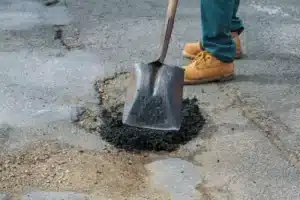Ever wondered whether to embark on a DIY project or hire a professional to seal your concrete driveway?
It’s a common difficulty faced by many homeowners. While both options have their merits, the choice largely depends on various factors such as budget, time, skill level, and the size and condition of the driveway. In this article, we’ll take a deep dive into the pros and cons of both options.
By the end of this article, you’ll clearly understand which option will deliver the best results. Don’t miss out! Keep reading to find out more.
DIY Concrete Sealing: Pros and Cons

Sealing concrete driveways using the do-it-yourself (DIY) approach presents both advantages and disadvantages. This method involves practical, hands-on work. Whether motivated by cost-saving or the satisfaction of accomplishing a home improvement project, DIY concrete sealing can be attractive. However, this approach comes with its own set of challenges and possible drawbacks.
Pros of DIY Concrete Sealing
DIY concrete sealing can be a cost-effective way to protect your concrete driveway. By sealing your concrete driveway, you can enjoy numerous benefits, including cost savings, flexibility, control over the process, and a sense of achievement.
Under this option, you also get to select the products and materials, decide on the application techniques, and schedule the project at your convenience.
Cons of DIY Concrete Sealing
Conversely, DIY concrete sealing does come with its hurdles. It requires a certain level of skill and the right equipment. The risk of incorrect sealing techniques and potential long-term complications also exists. If the sealant is poorly applied or the surface isn’t properly prepared, it may result in a short lifespan and decreased sealant effectiveness–you should avoid this!
There is also the safety concern, given that concrete sealers contain volatile organic compounds and other chemicals that may be harmful if inhaled or upon exposure to fresh concrete.
Professional Concrete Sealing: Pros and Cons
If DIY isn’t your cup of tea or if you prefer the expertise of a professional, hiring a contractor for concrete sealing could be the right choice. Professional services bring expertise, access to high-quality materials and equipment, effective techniques, time-saving measures, and durable results.
Pros of Professional Concrete Sealing
Hiring a professional for concrete sealing brings the advantage of their expertise and the peace of mind that comes from their experience. A professional contractor’s work is likely to have a longer lifespan than if you were to do it yourself. This is because they:
- Use high-quality materials
- Use cutting-edge tools
- Adhere to the proper application techniques
- Save you time
Professionals are also equipped to manage larger driveways or those in poor condition, aspects that might pose a challenge for a DIY project. A durable driveway is essential for long-lasting results.
What Are the Cons of Professional Concrete Sealing?
The main ‘challenges’ of professional services usually involve cost and dependency. Hiring a professional can seem expensive, with costs including labor fees, material costs, and equipment acquisition. There’s also the reliance on the contractor’s availability and scheduling.
However, compared to a DIY job, in choosing professional concrete sealing, you will get a flawless, speedy, and long-lasting service for your driveway concrete sealing.
Factors to Consider When Choosing DIY or Professional Services
Several factors balance the decision between a DIY driveway project or professional services.
Budget Constraints
Budget typically comes first when weighing the decision between DIY and professional concrete sealing. DIY driveway sealing can be a financially sensible option if you’re prepared to devote time and effort and have the required expertise. However, it’s vital to consider all potential expenses you will incur in the process and those you stand at risk of getting, including repairs, substandard materials, the price of the concrete sealer, and any other tools or equipment necessary for the task.
Conversely, while professional services may initially cost more, they could yield superior and more enduring results, potentially resulting in cost savings in the long run.
Time Availability
The availability of time is another significant factor. DIY concrete sealing might take anywhere from a few hours to several days, depending on the size of your driveway. On the other hand, engaging a professional can be a time-saver, given their expertise and access to tools that enable efficient job completion.
Skill Level and Experience
Your skill level and experience can significantly impact the success of a DIY concrete sealing project. If you have experience with DIY and a solid understanding of concrete maintenance and repair, you might feel confident undertaking the project yourself. However, if you’re a beginner, the project could be challenging and time-intensive, making hiring professional services an attractive alternative.
Driveway Size and Condition
The size and condition of your driveway will also influence your decision. DIY concrete sealing might be feasible if you have a small driveway in good condition. However, for larger driveways or those in poor condition, hiring professional driveway sealers for driveway sealing might be more practical and cost-effective in the long run.
How to Choose the Right Concrete Sealer
Concrete sealers are available in an array of forms, each offering unique advantages and disadvantages. Regardless of whether you choose DIY or professional concrete sealing, selecting the appropriate sealer is pivotal to the project’s success.
Here are some guidelines on how to make an appropriate selection.
1: Consider the Type of Concrete Sealer Perfect For Your Driveway Sealing

A broad range of concrete sealers is available, including Penetrating sealers, Acrylic sealers, Epoxy sealers, and Polyurethane sealers. Each type of sealer possesses unique properties and applications. For example, penetrating sealers provide robust protection while maintaining the concrete’s natural appearance, whereas acrylic sealers impart a glossy or satin finish to the concrete. Understanding the differences among concrete sealers can guide you in choosing the one that’s best suited to your project.
2: Consider the Environment
Environmental considerations significantly influence the selection of a concrete sealer. Given that concrete sealers contain potentially harmful chemicals, choosing eco-friendly sealers devoid of hazardous substances and with minimal environmental impact is important. Also, climatic conditions such as extreme temperatures can affect the application and curing process of the sealer. Thus, it’s important to consider environmental factors when selecting a concrete sealer.
3: Consider the Application and Maintenance Requirements
Different types of sealers have different application methods and maintenance requirements. For instance, acrylic sealers generally require reapplication every 2-4 years. Understanding the application and maintenance requirements of a sealer can assist you in selecting one that aligns with your needs and preferences.
Tips for Successful DIY Concrete Sealing
If you’re considering the DIY approach for concrete sealing, here are some tips for successful project execution.
1: Ensure A Proper Surface Preparation
Adequate surface preparation is key to a successful DIY concrete sealing project. A clean and well-prepared surface ensures better adhesion of the sealer and a more durable result. This involves the removal of any oil, stains, dirt, and debris, along with etching the concrete to create a rough texture, thereby improving adhesion.
2: Get the Right Tools and Equipment
The selection of appropriate tools and equipment can greatly influence the result of your DIY concrete sealing project. High-quality tools can ensure a more consistent application, leading to superior protection and greater longevity of the concrete surface.
3: Following Manufacturer Instructions
Adhering to the manufacturer’s instructions is imperative for the proper application and upkeep of a concrete sealer. The instructions from the manufacturer ensure accurate and efficient application of the concrete sealer, aiding in achieving optimal results and extending the seal’s lifespan.
Tips for Hiring a Professional Concrete Sealing Contractor
If you’ve opted to engage a professional for your concrete sealing project, here are some pointers to help you select the right contractor.
1: Research and Compare Contractors
Begin by conducting research and comparisons among contractors. Evaluate their experience, work quality, customer reviews, and the range of services they offer.
2: Check Reviews and Testimonials
Reviewing feedback and testimonials provides insight into the contractor’s reputation and the caliber of their work. While at it, watch out for consistent positive feedback, in-depth reviews, high ratings, and recommendations, then recent and frequent reviews.
3: Request Quotes and Assess Value
Request for quotes from several contractors to gauge the value. When assessing value for money, take into account factors such as cost, the quality of materials, the contractor’s experience and reputation, warranty, and any additional services offered.
Frequently Asked Questions
Should I seal my driveway myself or hire someone?
DIY projects are not worth the time or money to do it yourself – hire a professional to seal your driveway for an even, professional finish and an attractive outdoor space.
What is the downside of sealing concrete?
The downside of sealing concrete driveway is that it can make surfaces slippery, especially when wet. Sealers tend to dry down with a glossy or semi-glossy sheen, which can be dangerous and increase the risk of falls or slips. We recommend blending in a fine abrasive to give your driveway a non-skid surface.
What are the benefits of professional concrete sealing?
Professional concrete sealing offers numerous benefits, such as expertise, high-quality materials and equipment, professional techniques, time-saving, and long-lasting results.
Final Thoughts
Whether you choose to go the DIY route or hire a professional for concrete sealing largely depends on various factors such as budget, time, skill level, and the size and condition of the driveway.
Both options have their pros and cons. Understanding the different types of concrete sealers, their application and maintenance requirements, and the environmental considerations can help you make an informed decision. Whether you’re sealing your driveway yourself or hiring a professional, the key to a successful project lies in careful planning, thorough research, and meticulous execution.
If you desire a flawless concrete driveway sealing service offered at a budget-friendly rate, reach out now to Greenville SC’s leading expert, Matt The Driveway Guy. Click here to request a quote right now.







